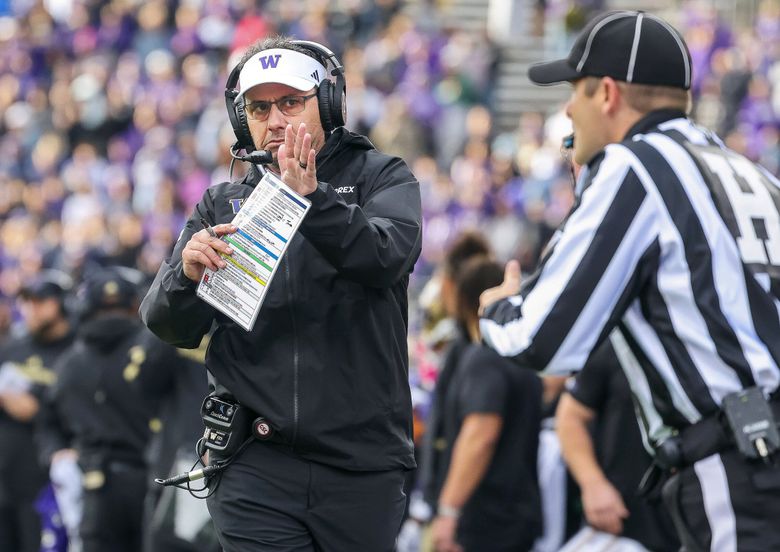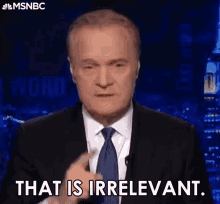How Jedd Fisch's clouded future at UW exemplifies state of college football

Coach Jedd Fisch runs down the sideline to call a timeout in the fourth quarter of UW’s win over Illinois last weekend at Husky Stadium. (Dean Rutz / The Seattle Times)
By Mike Vorel Seattle Times columnist
Winning is only one part of building a sustainable program.
So said Jedd Fisch on Dec. 4, 2023, after his Arizona Wildcats earned a berth in the Alamo Bowl. In a news conference, Fisch — then the Wildcats’ third-year head coach — was asked what he could learn from Washington, which went from winning the previous Alamo Bowl to an undefeated regular season, a Pac-12 title and a College Football Playoff trip in 2023.
“They got everybody to come back. That’s what happened,” said Fisch, whose Wildcats went 9-3 in the regular season. “Assuming everybody comes back, then I would think we too will have a great opportunity. When teams try to poach your players, when teams try to convince players to leave programs to go to another program, you’ve got to be able to not allow that to happen. That’s what Washington was able to do. I think that’s a key part of sustainability and building a program.”
That applies to coaches as well as players.
Because you already know what happened next.
Kalen DeBoer went to Alabama, Fisch went to Washington, and both coaches essentially poached their own players. Germie Bernard, Parker Brailsford, Josh Cuevas and Austin Mack followed DeBoer to Tuscaloosa. Jonah Coleman, Demond Williams Jr., Ephesians Prysock, Isaiah Ward, Adam Mohammed and more followed Fisch to Montlake. Both programs were forced to fill their rosters on the fly.
This is not a Washington problem or an Arizona problem. It’s the state of college football in 2025.
Because college football has a food chain, where ascending coaches and players are snapped up by bigger fish. If you don’t win enough, you remain irrelevant. If you win too much, you pay a different price.
As Jedi master Qui-Gon Jinn said in “Star Wars: Episode 1 — The Phantom Menace,” “There’s always a bigger fish.”
Advertising Skip AdSkip AdSkip Ad
Unless your money and resources and opportunity make it almost impossible to be poached. Unless you’re Ohio State or Georgia or Alabama or Texas or Notre Dame.
Despite its two national titles, despite its pair of CFP appearances, despite its entry into the Big Ten’s band of bullies, UW does not reside atop the food chain. For proof, look no further than Jan. 16, 2024, when then-UW athletic director Troy Dannen introduced Fisch as the Huskies’ next head coach.
“We want this to be aspirational in every way,” Dannen said at the time, after Fisch politely declined to promise an extended stay. “The best should seek us out. We don’t control anyone’s lives and what they choose to do in their lives. The best we can do is make sure this place remains a destination location in everything we do. I told Coach (Fisch), we had this exact conversation during the process, and I said, ‘I want this to be such a good job that you don’t want to leave.’”
Dannen left for Nebraska less than three months later.
So, that’s how we arrived here, with Fisch sidestepping questions about his coaching future. The Huskies are 6-2, with bowl eligibility already secured and winnable games against Wisconsin, Purdue and UCLA still on the schedule. Should they sweep that trio, the 9-2 Huskies would host rival Oregon on Nov. 29 with a CFP appearance likely on the line.
But winning is only one part of building a sustainable program. Retention is another.
Which, in an unmerciful food chain, is harder than ever. With four games to play in the regular season, head coaches have already been fired at LSU, Florida, Penn State, Arkansas, Oklahoma State, UCLA and Virginia Tech. Most of those schools will hire sitting coaches who will poach their own players, and the dominoes will drop. Unsurprisingly, Fisch’s name has been tied to openings at Florida (his alma mater) and UCLA (where he coached in 2017).
When asked on Oct. 20 how he’d assess his long-term future at UW, Fisch said: “Yeah, I’m not going to address any of the coaching changes or coaching rumors or anything to that effect. I’ve learned from that. The most important thing we can do here is talk about being where our feet are. And I think it’s a really important time for us to play really well this week, and that’s what our focus is on.”
This, though, is the paradox UW and most other programs must perpetually navigate. The more Washington wins in the present, the more difficult — and expensive — it is to protect its future. Like Icarus flying too close to the sun, a team’s success could cost its coach and quarterback, if the right offer comes.
As Fisch said, before unintentionally proving his own point: “You’ve got to be able to not allow that to happen.”
It’s certainly possible, maybe even likely, that Fisch stays in Seattle in 2026. That Williams, UW’s standout quarterback, stays alongside him. That these coaching rumors were extension fodder from an opportunistic agent. That Fisch — who has made 11 separate stops in the past 17 years — builds something sustainable. That he builds UW into an even bigger fish.
But gone are the days when Jim Owens and Don James spent a combined 35 straight years as the Huskies’ head coach.
Sustainability is expensive. Winning is not enough.
Mike Vorel: mvorel@seattletimes .com. Mike Vorel is a sports columnist at The Seattle Times.
Comments
-
leave
-
Jedd is a 100 percent media creation. From his one winning season where he didn't beat anyone to the current bullshit that he's a hot coach on the market
Sark is envious
-
I’m with @RaceBannon
I suspect his agent isn’t rushing to clear up the confusion.
i fall back to the Alabama job isn’t opening and every one of those jobs are dumpster fires worse then UW with more BS. -
Has Jedd cracked the .500 mark for his career yet?
-
-
Came here to say this. The only people talking about Jedd having a cloudy future are the media who have no sources and nothing else to talk about.
-
if there’s anything cloudy about Fisch’s future, it’s whether he’s good enough to keep the UW job
Jury is still out on that one, but if he loses more than one game the rest of the season, he’s not it
-
Agree that there's way too much media fluffing going on with his resume right now. He hasn't done shit yet at UW meriting big time jerb rumors. 10-2 with an upset over Oregon would be a different story.
That said, 2023 Arizona was still a good season for that school with 3 wins over Top 25 and beating Boomer Soon in the Alamo Bowl.
Jedd has made all his 3 footers this year.
-
It all comes down to November
Not impressed with Arizona
-
Yeap, 6-2 with this schedule is Par. He still has 4 games to either go over/under against.
The big selling point for all the doogs with him despite going par has been @incremetal_progress towards next year.
If he bolts after going 9-3 it's a big fat failure.









